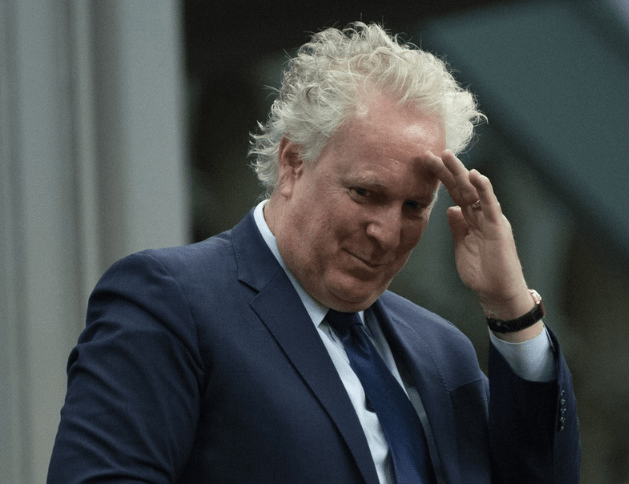Jean Charest and the Party that Snubbed Him
L. Ian MacDonald
January 22, 2020
Jean Charest acknowledged one problem with the prospect of running for leader of the Conservative Party more than two decades after leaving Ottawa to become Liberal leader and three-term premier of Quebec.
“It takes time to reintroduce yourself,” Charest said Tuesday after announcing his decision not to run for the Tory leadership, 22 years after he relinquished it to take on the sovereigntists in the 1998 Quebec election.
He didn’t really have a choice then—it was a question of country, and he was seen as the only credible leader of the federalist forces to oppose the governing Parti Québécois and the charismatic premier, Lucien Bouchard, in an election campaign still dominated by the residual bitterness of the 1995 referendum.
Bouchard tried to close the books on another referendum, saying one would be held only under “winning conditions,” which was to say “never again.” By mid-mandate, Bouchard had quit, fed up with the PQ’s internal fights, setting the stage for Charest to defeat his successor, Bernard Landry, in 2003.
This time, Charest had a choice, having served nine years as premier and, even in defeat in 2012, leaving the Liberals as a strong opposition in a minority legislature, poised to regain office, which they did under Philippe Couillard only 18 months later.
This time, Charest had also built a thriving international law practice at McCarthy Tétrault’s Montreal office. With his wife, Michèle Dionne, he had bought a winter home in Palm Beach. Their three kids were grown and doing well on their own. At 61, did he really need another leadership campaign? Well, yes, if he still wanted to be prime minister, a door of opportunity that opened with the party’s current leadership campaign.
But there was an early moment of truth—winning the election would be one thing, winning the leadership quite another. It would be more difficult to win the convention first than the country later. The barrage of dissuasive headlines that greeted his early musing about a run made that clear.
This was not the Progressive Conservative Party of a generation ago, when Charest was first called to Brian Mulroney’s cabinet at the age of 28, and in which at 33 he held the senior environment portfolio at the Rio Earth Summit of 1992. It was not even the party that was reduced to two MPs under the misbegotten leadership of Kim Campbell in 1993, or even the party that recovered to 20 seats with Charest as leader in 1997.
Rather, this was the Conservative Party of Canada co-founded by Stephen Harper and Peter MacKay in the 2003 merger of the Canadian Alliance and the PCs, an odd commingling of right-wing western conservatives and progressive Red Tories like Charest from central Canada, many of whom drifted away under Harper’s leadership. By the time Harper became PM in early 2006, Charest had already been in office in Quebec for three years, often taking positions at odds with Harper on everything from climate change to fiscal federalism.
Not that Harper bears any grudges about that. Reports that he resigned from the Conservative Fund so he could stand in the way of Charest’s return to Ottawa were surely exaggerated to add to the steady drip of repellant narrative drops directed at Charest.
But the resistance to Charest’s return among Harperites, the western wing and social conservatives wasn’t his only obstacle. There was also a revival of a story in the French-language media seeking to link Charest with illegal corporate fundraising by a Quebec Liberal bagman during his leadership, as well as revived attempts to smear him in an inquiry into Quebec’s notoriously corrupt construction industry.
Which became the story of the last week of his putative leadership campaign, along with his law firm representing Chinese telecom giant Huawei on its bid to provide next generation 5G wireless networks to Canada just as the extradition hearing of the company’s CFO, Meng Wanzhou, was gearing up in Vancouver.
Which might have been enough for Michèle Dionne. “Jean was never going to do this without Michou being in favour,” said one old friend of Charest.
That left a narrower field of credible leadership candidates, led by MacKay from the party’s progressive wing, with bilingual finance critic Pierre Poilievre, and foreign affairs critic Erin O’Toole, all waiting to see whether Rona Ambrose entered the race.
They didn’t have long to wait—late Wednesday she put out a Facebook video in which she said she’d thought seriously about it, but after 13 years of public service was enjoying her private and family life. No thanks, said the erstwhile front runner.
As for Charest, he has a record in office at two levels of government. He was environment minister in 1992 when Canada became the first G7 country to ratify the UN Convention on Climate Change, which is today the starting point in any conversation on the environment.
As premier of Quebec, he was the founding father of the Council of the Federation, replacing the old premiers’ conference as the voice of the provinces with Ottawa. On trade, it was Charest who wouldn’t let go of the idea of a Canada-Europe Trade Agreement.
That Chrystia Freeland was finally able to sign off on it for Canada at the end was due to Charest’s persistence from the beginning.
And in 1995, when the future of the country itself was at stake, it was Charest’s passion for a united Canada that made a decisive difference in what proved to be a harrowing vote won by Team Canada by only a single point.
Anyone who was at Place du Canada, at the historic rally of 100,000 people three days before the Oct. 30 vote, can attest to that. For which the country is forever in his debt.
L. Ian MacDonald is editor and publisher of Policy.

